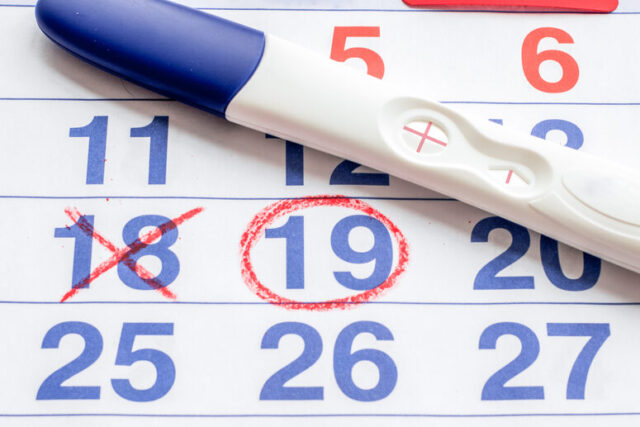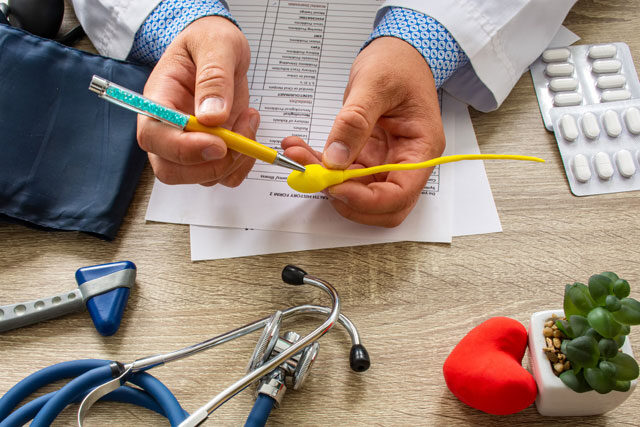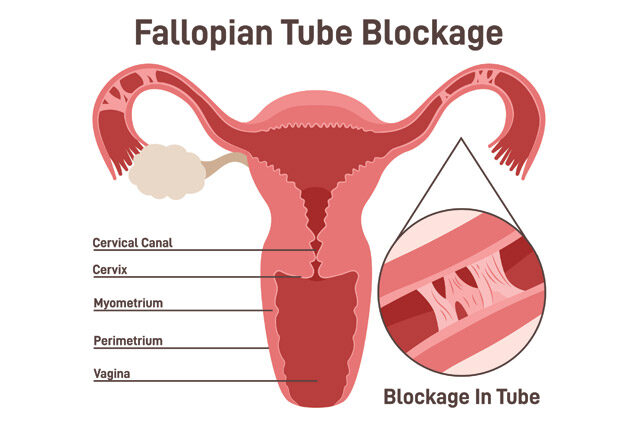When to Test for Pregnancy if Irregular Periods? – While it’s more or less clear about testing for pregnancy in women with a 28 days cycle, things get difficult when it comes to testing women with irregular menstrual cycles. Today, we’ll try to give answers to the most common questions regarding this point and provide you with a guide on when a home pregnancy test can show an accurate result.
Normal vs. Irregular Menstrual Cycle
To make it clear what is considered an irregular cycle, let’s specify what a normal cycle is. Gynecologists consider it a norm if the period between the first day of the previous cycle and the first day of the new one ranges between 21 – 35 days. Any violations one way or another, signal your menstrual cycle being irregular.
The causes for such an abnormality vary. We’ll name the most common so that you may understand if you have any health issues that may affect the regularity of your periods.
- Significant weight gain or vice versa weight loss may trigger changes in your cycle. Try to keep your weight within the accepted norms to avoid such problems.
- The use of hormonal birth control methods may also change your body’s presets, causing irregular menses.
- Thyroid disorders also have a strong impact on the female menstrual cycle. Both underactive and overly active thyroid affect the woman’s health.
- Polycystic ovaries are one more common reason for your periods to become chaotic.
You may try to stabilize your cycle by taking hormonal therapy, living a healthy lifestyle, and using other than hormonal methods of preventing pregnancy. Still, there’s no guarantee these will make your periods like clockwork.
When Should I Test for Pregnancy?
Determining if you are pregnant with irregular periods is pure math. While you may have no idea when you’ve had ovulation and had your fertility window open, you should definitely know the day of the beginning of your previous cycle.
Having that date as a starting point, you should count 36 days to pass since that time to do a pregnancy test. If you have a long cycle, which typically exceeds 35 days, doctors recommend testing on days 42 – 49 from the date of your last period.
Women whose cycle is shorter than 21 days may use pregnancy tests much earlier. Such patients may get a positive test result starting from the 21st day of their last known cycle, as they may get pregnant as early as 7 days after the first day of their menses.
Is Early Testing for Pregnancy Informative with Irregular Cycle?
The reliability of a urine test depends on when you use it in your cycle. Early pregnancies detection with irregular menses is much more difficult than usual. If you do it too early, you may receive a false negative. However, this doesn’t mean conception hasn’t taken place. It just says that the levels of HCG are insufficient to be noticed.
Abnormally durable or short cycles make it difficult to figure out the exact day when you ovulate, which is why there’s no distinct guide on when you can find out about your new status early in the pregnancy. Therefore, a month-long wait is the most reliable tactic a patient with irregular periods can apply to find out if theyare expecting a baby or not.
How can I know I’m pregnant or not with 100% accuracy? Of course! The only 100% reliable method to learn about a new life growing inside you is to do some blood tests. Particularly, a test looking for the levels of human chorionic gonadotropin. This hormone is an indicator of pregnancy, as its secretion starts only after the implantation of the fertilized egg has taken place.
One more way to confirm pregnancy is via ultrasonography testing. Due to this method, your healthcare provider may not only detect a gestational sack with an embryo in your uterus but can also define the exact pregnancy term.
Any abnormalities in the development of pregnancy, including ectopic pregnancy, can be defined by the HCG levels and ultrasound. Home tests for pregnancy cannot provide such information.
Can I Trust the Results of Home Pregnancy Test?
Depending on the reason for your irregular menses, the results of testing may not reflect the actual situation. There is a chance that you receive a false positive or negative result.
The first situation is possible in case of the so-called chemical pregnancy. That’s when a fertilized ovum has been formed but couldn’t implant into the walls of the womb or elsewhere to continue developing. A recent miscarriage may also show as two lines on a pregnancy test.
The opposite situation is more common, however. And an irregular cycle only adds to the chances that you’ll see a single line on a test stick while pregnant. The typical causes of false negative include:
- testing well in advance of an estimated period date;
- not sticking to the instructions on the test use;
- drinking a lot of water before testing;
- doing the test in the daytime instead of in the morning;
- checking on the result earlier than recommended.
Having an irregular cycle brings about some challenges for finding out about pregnancy at a very early stage. However, keeping track of your menses and waiting can help you avoid the bitterness of a false negative test if you’ve hoped it to be different.
Is there a way to increase the reliability of home tests for pregnancy? In fact, yes. The use of a pregnancy test kit, which typically contains several test sticks, can help you enhance the trustworthiness of the received results. Such packages are designed for testing for several consecutive days. How does this help? The thing is that HCG doubles daily during the first days of pregnancy. So there is a point in applying such a tactic.
When to Test for Pregnancy if Irregular Periods? – Summing up
Choosing the right time for testing can save you from unneeded worries related to the test results. The more precisely you count the best date for testing, the higher the chances that you’ll get an accurate result from the first try.
With an irregular menstrual cycle, you need patience and time to know for sure if you are pregnant or not. Still, this pays off with the clarity of the result.




